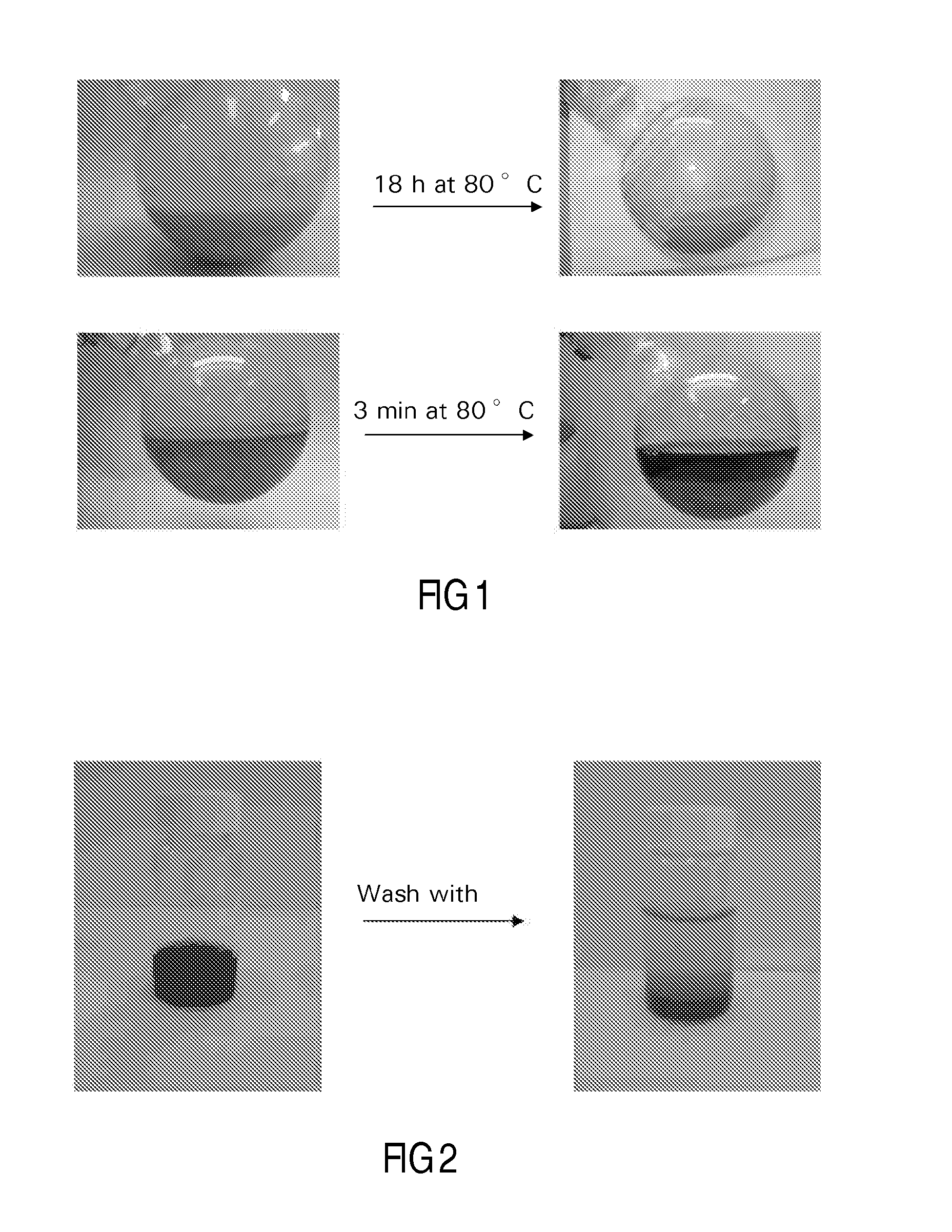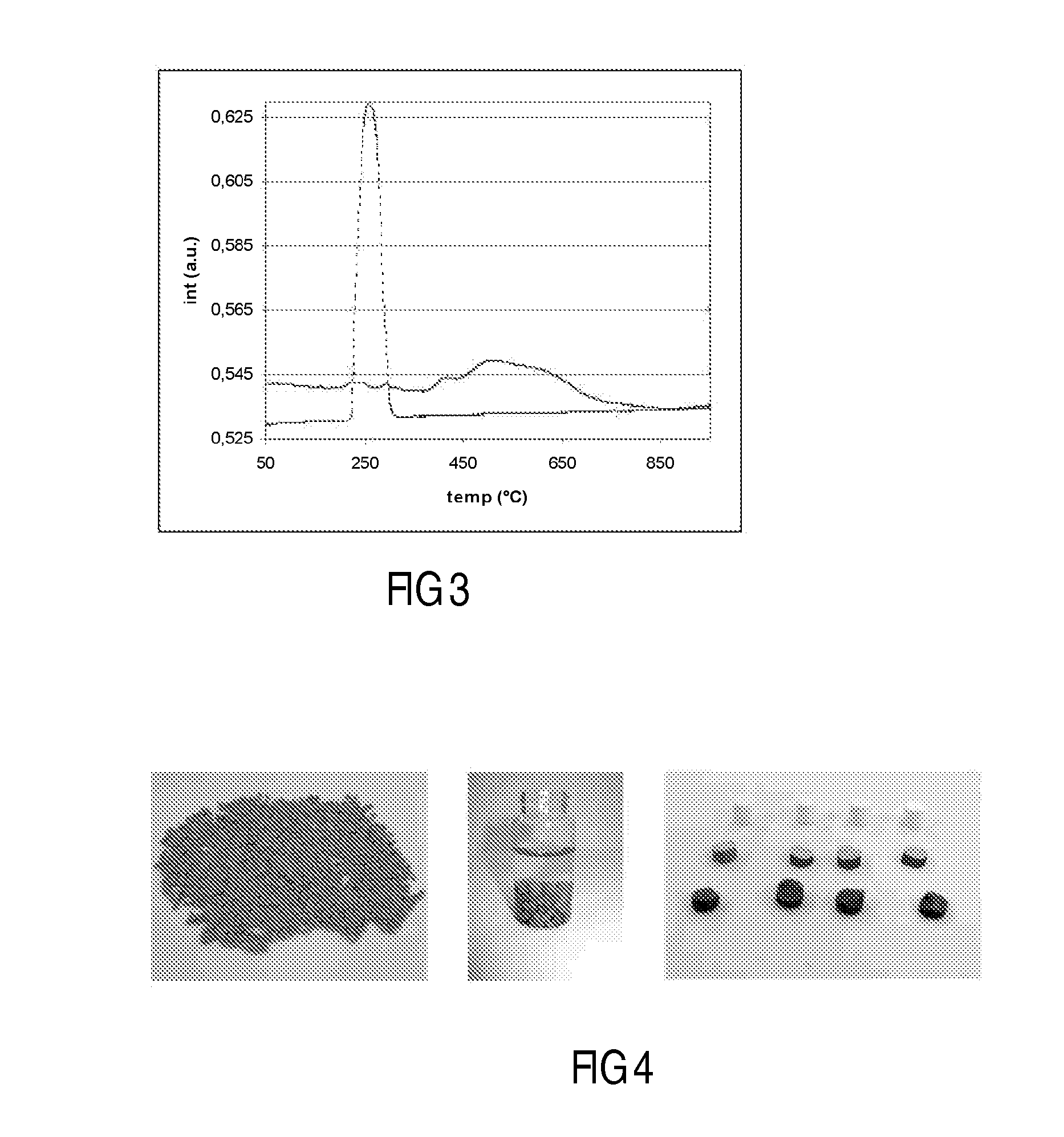Catalysts
a catalyst and catalyst technology, applied in the field of catalysts, can solve the problems of reducing affecting the total process cost of the catalyst fabrication and the time required to prepare the catalyst, and the maximum amount of metal that can be deposited per impregnation step, etc., to achieve the effect of increasing the activity of the catalyst, and improving the attrition resistan
- Summary
- Abstract
- Description
- Claims
- Application Information
AI Technical Summary
Benefits of technology
Problems solved by technology
Method used
Image
Examples
example 2
Co(OH)2 Only
Preparation of Inventive Catalyst Precursor 2
[0119]A 5.0 g Co / 100 g support catalyst precursor was prepared on a particulate silica modified alumina support using chemisorption, followed by direct fluidised bed calcination in air.
[0120]In particular, the catalyst precursor was prepared as follows:
[0121]40 g of silica modified alumina was added to a suspension of 3.2 g of particulate cobalt hydroxide in 90 ml of water. The resulting mixture, which was in the form of a slurry, had a pH of 7.5. Aqueous slurry phase chemisorption was effected for 18 h at 80° C. During this process the pH slowly decreased to 5. The water layer was decanted from the mixture, and after three washings with water, the light purple colored product was dried at 40 mbar and 80° C. This vacuum dried treated catalyst precursor or intermediate was subjected to fluidized bed calcination, according to the following procedure using a continuous air flow of 1.6 dm3n / min, while increasing the t...
example 3
Co(OH)2 and Co(NO3)2 in Succession
Preparation of Inventive Catalyst 3
[0122]A 20 g Co / 0.070 g Pt / 100 g support catalyst was prepared on a particulate silica modified alumina support using sequential chemisorption-impregnation aqueous slurry phase preparation and drying, followed by direct fluidised bed calcination in air.
[0123]This preparation was done by means of two preparation steps: The first preparation step included chemisorption using cobalt hydroxide, while the second preparation step included impregnation using cobalt nitrate.
[0124]In particular, the catalyst was prepared as follows:
[0125]A cobalt nitrate solution was prepared using Co(NO3)2.6H2O and Pt(NH3)4.(NO3)2 resulting in a solution containing 140.2 g / l Co and 0.5328 g / l Pt. The pH of the solution was adjusted to 2.7 using nitric acid.
Chemisorption / Impregnation
[0126]40 g of silica modified alumina was added to 3.2 g of particulate cobalt hydroxide in 90 ml of water. The resulting suspension had ...
example 4
Co(OH)2 and Co(NO3)2 Simultaneously
Preparation of Inventive Catalyst 4
[0130]A 19.2 g Co / 0.070 g Pt / 100 g support catalyst was prepared on a particulate silica modified alumina support using simultaneous chemisorption-impregnation aqueous slurry phase preparation and drying, followed by direct fluidised bed calcination in air.
[0131]This preparation was done by means of a single preparation or processing step: The step included chemisorption using cobalt hydroxide and impregnation using cobalt nitrate. Thus, chemisorption and impregnation takes place in the same process step and is referred to as simultaneous chemisorption and impregnation.
[0132]In particular, the catalyst was prepared as follows:
[0133]A cobalt nitrate solution was prepared using Co(NO3)2.6H2O and Pt(NH3)4.(NO3)2 resulting in a solution containing 140.2 g / l Co and 0.5328 g / l Pt. The pH of the solution was adjusted to 2.7 using nitric acid.
Chemisorption / Impregnation
[0134]40 g of silica modified a...
PUM
| Property | Measurement | Unit |
|---|---|---|
| pressure | aaaaa | aaaaa |
| temperature | aaaaa | aaaaa |
| temperature | aaaaa | aaaaa |
Abstract
Description
Claims
Application Information
 Login to View More
Login to View More - R&D
- Intellectual Property
- Life Sciences
- Materials
- Tech Scout
- Unparalleled Data Quality
- Higher Quality Content
- 60% Fewer Hallucinations
Browse by: Latest US Patents, China's latest patents, Technical Efficacy Thesaurus, Application Domain, Technology Topic, Popular Technical Reports.
© 2025 PatSnap. All rights reserved.Legal|Privacy policy|Modern Slavery Act Transparency Statement|Sitemap|About US| Contact US: help@patsnap.com



